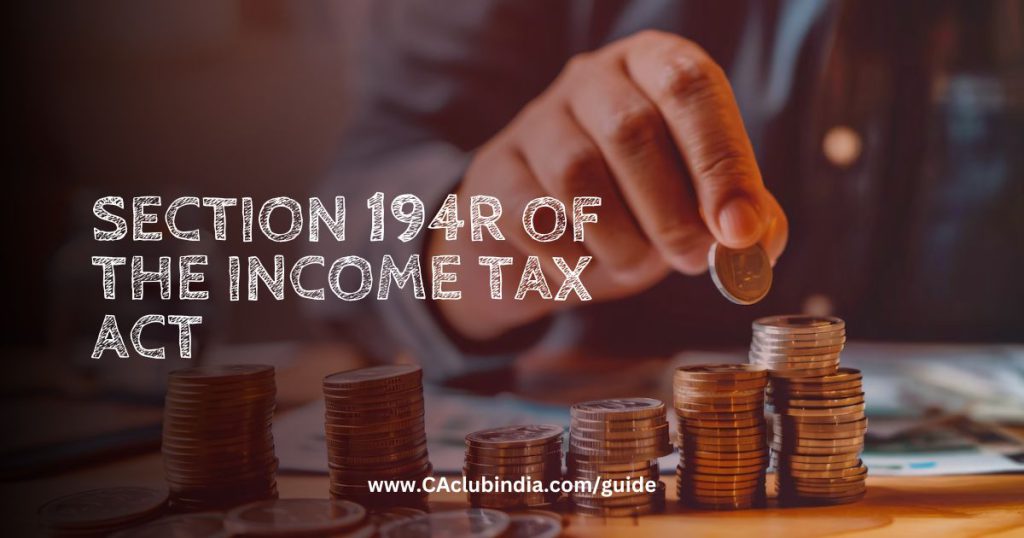Section 194R TDS, introduced in the Income Tax Act, 1961, mandates the deduction of Tax Deducted at Source @ 10% on benefits or perquisites provided to residents in the context of their business or profession if exceeds Rs. 20,000 in a financial year.
Applicability
- This applies to deductor – individuals, HUF, companies or entities providing a benefit or perquisite in cash, kind, or both.
- The recipient must be a resident assessee.
- TDS is deducted only when the total value of benefits exceeds INR 20,000 in a financial year.
Deduction
- TDS is deducted at 10% (20% in case of no PAN) on the value of benefits.
- TDS must be deducted before providing benefits or perquisites to deductee.
- The provider is responsible for TDS deduction.
- Valuation is based on fair market value.
Return and Certificate
- File quarterly TDS return (Form 26Q).
- Issue Form 16A to recipient every quarter.
Examples of benefits or perquisites
- Expenditure on family trip accompanying the person on business conference trip.
- Incentives in the form of cash or kind such as gold coins, mobile phones, TV etc.
- Free medicine samples provided by a company to a doctor.
- Expenses attributable to leisure trip or leisure component, even if it is incidental to the dealer or business conference.
Non Applicability of provision of Section 194R
- Benefits received by employees are taxed under Section 192, not Section 194R.
- Recipient is a non resident.
- No business relationship.
- Value of benefits is less than Rs. 20,000 in a year
- Turnover in case of business is less than 1 Crore and in profession less than 50 lakh
- Cash discount, sales discount or rebate
- Gift on festival or marriage ceremony
TDS on Reimbursement of Expenses
When TDS Is Required
If you spend on something like travel, and the client reimburses you the amount, it will be treated as a benefit or perquisite and TDS may be deducted.
When TDS Is Not Required
If the travel bills are in the client’s name – you paid it and reimbursed by the client, then no TDS on the reimbursement.
If the expense is part of your professional fees and TDS has already been deducted under Section 194C or 194J, then no separate TDS is needed on reimbursement.
How is the valuation of benefit/perquisite require to be carried out?
The valuation will be based on the FMV of benefits or perquisites except in the following cases:
- The benefit/perquisite provider has purchased the benefit/perquisite before providing it to the receipient . In that case, the purchase price shall be the value of such benefit/prequisite.
- The benefit/perquisite provider manufactures such items given as benefit/perquisite, then the price that is charged to its customers for such items shall be the value of such benefit or perquisite.
It is further clarified that GST will not be included for the purpose of valuation of benefit/perquisite for TDS under section 194R of the Act.
FAQs
Section 194R applies to domestic transactions, with a 10% TDS rate on benefits when amount exceeds Rs. 20,000 in a year. On the other hand Section 195 applies to payments made to non-resident Indians.
Section 194R does not apply when there is an employer-employee relationship or allowances are received by a non-resident Indian.
The TDS rate under Section 194R for reimbursements exceeding Rs. 20,000 is 10%.


